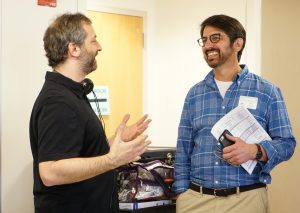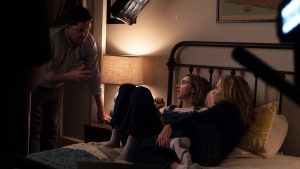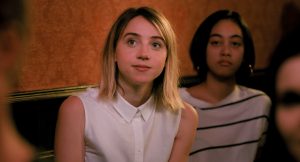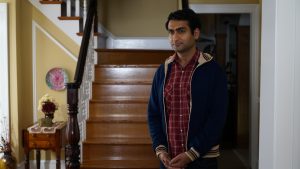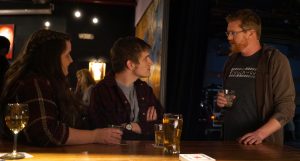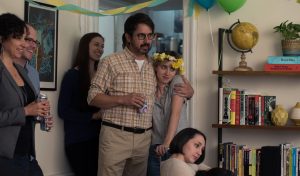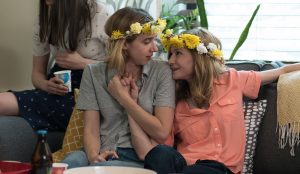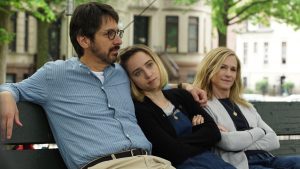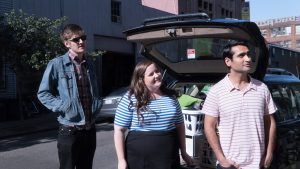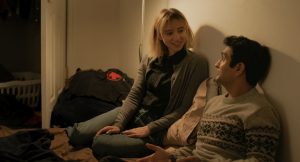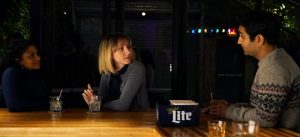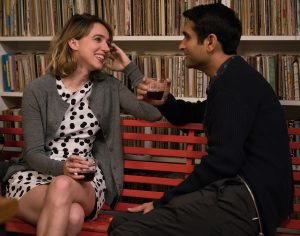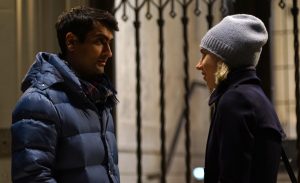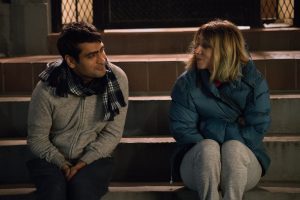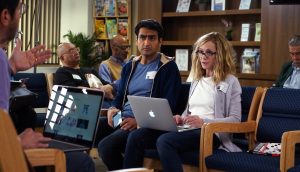June 23, 2017
by Carla Hay
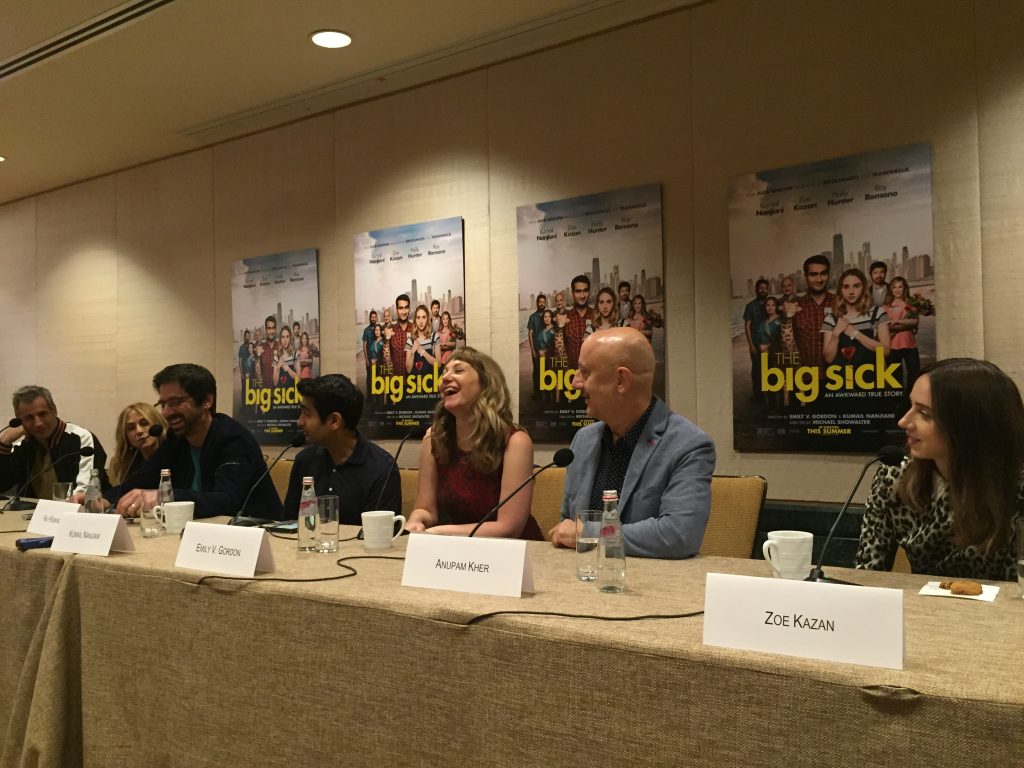
Based on the real-life courtship between screenwriters Kumail Nanjiani and Emily V. Gordon, the comedy film “The Big Sick” tells the story of Pakistan-born aspiring comedian Kumail (played by Nanjiani), who connects with grad student Emily (played by Zoe Kazan) after one of his stand-up sets. However, what they thought would be just a one-night stand blossoms into the real thing, which complicates the life that is expected of Kumail by his traditional Muslim parents (played by Anupam Kher and Zenobia Shroff), who want him to enter into an arranged marriage with a woman of Pakistani heritage.
When Emily is beset with a mysterious illness that leaves her in a coma, it forces Kumail to navigate the medical crisis with her parents, Beth and Terry (played by Holly Hunter and Ray Romano), whom he’s never met before, while dealing with the emotional tug-of-war between his family and his heart. “The Big Sick” was directed by Michael Showalter, written by Gordon and Nanjiani, and produced by Judd Apatow and Barry Mendel. Here is what Nanjiani, Gordon, Kazan, Hunter, Romano, Kher and Mendel said when they gathered for a New York City press conference for “The Big Sick.”
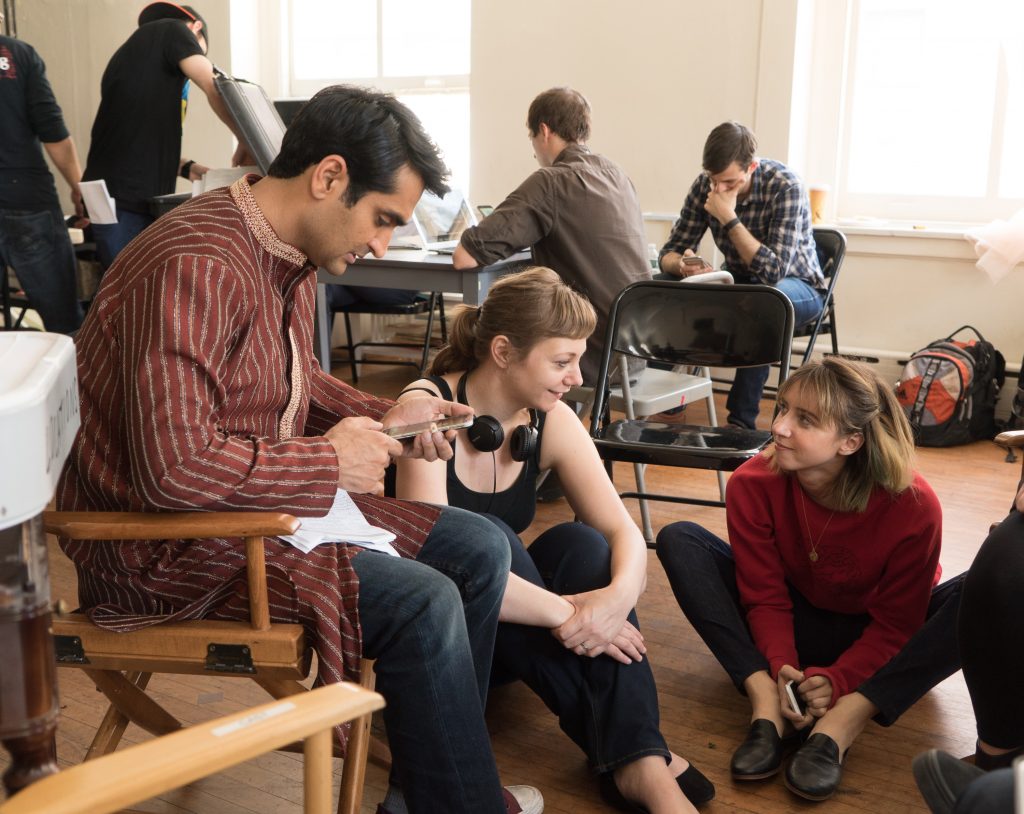
Barry, what was it like to make a real-life story into a movie?
Mendel: Judd [Apatow] met Kumail at South by Southwest, and Kumail came in and told Judd and me the story. And Judd and I were moved by it. At the time, Kumail wasn’t the star of a big, successful show.
Nanjiani: Yeah, this was a year before the show [“Silicon Valley”].
Mendel: Our attitude was like, “This movie might end up costing $800,000 to make. It might be a very, very small movie.” We just loved the idea of trying to tell the story and do a good job on the film. There have been lots and lots of stories that people try and take from their true life and put on screen. Most of the time, it doesn’t go well. For us, it was a great challenge.
I think everybody has been in situation where you’re in a medical crisis, or you’re just in a very serious situation. It is surprising that some of the greatest moments of humor in your whole life can come out of those situations. Kumail, as a comedian, in the way he told the story, he was not going to shy away from what was serious about it but also able to find the humanity or at least where humor is a release valve for the intensity for what you’re feeling. It’s really consistent with a lot of the work that Judd’s done, that I’ve done—separately and together. It just seemed like it would be ripe with possibilities.

Kumail and Emily, at what point were you able to extract yourselves and say about your story, “Hey, other people might find this interesting”?
Gordon: I think early on. Judd and Barry were very good about us not wanting to be precious about our own story. It went from our story to a story that everybody could collaborate on, that everybody had input in, that everybody could hopefully watch and enjoy. So Barry and Michael Showalter were very, very good about encouraging us to always have the emotional truth of things but always make sure that we were changing things to make the more dramatic or funnier while keeping an emotional truth to it.

Kumail, were you concerned about taking a comedic approach to something so dramatic as Emily’s life-threatening illness?
Nanjiani: Yeah, that was always going to be the challenge that we were talking about in the beginning. It was mostly me and Emily’s parents just sitting there with hurricanes in our heads, but our faces were [he makes a stoic face]. So we knew our challenge was going to be to make it funny. But what Barry did from the very beginning was say, “Don’t worry about the funny just yet. Write it, and we’ll put the jokes on at the end.”
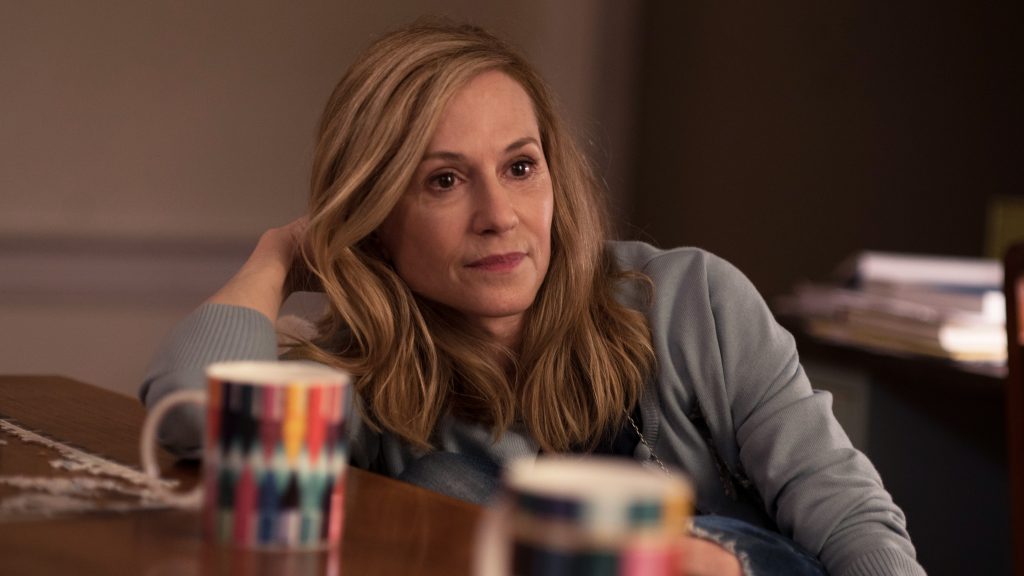
Holly, what was your starting point to playing Emily’s mother?
Hunter: It’s a testament to the over-arching confidence that manifests its way through the whole movie. Judd and Barry and Kumail and Emily, they walked through fire to put this down on paper. It couldn’t have been an easy thing to accomplish. You did all that work with Barry and Judd. And then we [the other actors] come along, and we’ve got all these ideas …
And then there was this overall process of accepting all of those ideas and seeing if they would fly. We had a really intense rehearsal period with the script where we were really going through the script and going through our ideas that would be additional, that might make the scenes even richer, more complicated. And that’s not always received as openly as it was with this project.
Mendel: We envy Mike Leigh, who goes off into the countryside and has his actors in a barn for a month to just talk about the script. You do a lot of that in the theater too, when you’re working on a play and getting it into shape to put it on the stage. So that’s our fantasy in all the movies that we do—to do that, so the actors can get a greater ownership of the part than, “Here, I’m going to execute the part as it was written.”
Also to make the movie feel lived in, which I think is a hard thing to do. I think a lot of movies, you watch them, and they feel like they’re fake. I think one of the things we strive to do—and because the acting is so good we were able to achieve it—is to make it feel lived in and real.

Ray, this isn’t a traditional comedic role for you. How did you figure that out for yourself?
Romano: There’s plenty of comedy in it. I got the script, and I read the role. I knew it was a real story. I knew the characters of Emily’s parents were open to interpretation. I just went out writing a little back story for the guy, and I sent it to the director, and I sent it to Barry.
I was able to make up this guy. I knew this wasn’t about researching Emily’s father. I found out he doesn’t look like me. I’ll tell you how I found out. Emily said that her mother watched the movie and said, “You know Holly Hunter is prettier than me, but your father is more handsome than Ray Romano.”
Gordon: Kumail told you that. I would have never told you that.
Nanjiani: I’m glad I’m giving you new material.
Romano: So that’s how I approached the character. I thought of how her father would really do it, and then I would just do it as if he were ugly.

Zoe, you’ve been a first-time screenwriter. How did it feel to portray someone in a movie who is the movie’s first-time screenwriter in real life?
Kazan: Because my parents are both screenwriters, and because I came up as an actor in the theater, I was drilled that the text is sacred, and it’s your job as an actor to fulfill the text and not alter the text. On previous projects, I felt sort of uncomfortable with some of the improv. I definitely get some of the rehearsal process that’s been alluded to earlier did have a creative aspect to it …
What drew me in from the start was the script. It wasn’t like it needed anything, but I felt that process actually helped me come to feel that I had intended to put some of myself into it as well so it didn’t feel like I was trespassing on someone else’s life all the time. And I think that allowed me to feel a little bit more comfortable making it my own on set, and not worrying about having Emily at the monitors watching what I was doing. In fact, what I came to feel like was that we were co-parents of the character—which I guess you’re always doing as an actor: you become co-parents or co-guardians of the character on the screen.

Anupam, how did working on this American independent film differ from your other film experiences?
Kher: I did this film not for my acting abilities but for emotional reasons … I met [Kumail’s] father for the role, and it was wonderful. I said, “How do you want me to prepare for the role?” And he said, “Just grow your beard. My father has one.” Sometimes, that’s how it goes. Sometimes in life, you have to do things for emotional reasons, not professional reasons. I think that was important.

Kumail, what was the most difficult thing about playing yourself? And how did you find that emotional truth?
Nanjiani: Barry and Judd were really helpful. Once we’d gotten our story down, they were like, “Now you have to separate yourself from the story, and trust that the emotional core will stay, and just make it a good story.” The most difficult thing about the acting was most of the stuff about Emily’s illness toward the middle-end part of the movie.
Gordon: It was kind of nice to have so many people weigh in on it, because the actual story got back to being our story. It helped me feel more okay.
Nanjiani: Mike [Showalter] would say to us often, “Separate yourself from this.” I think Emily understood that before I did.
Gordon: It really made the movie better, I think.
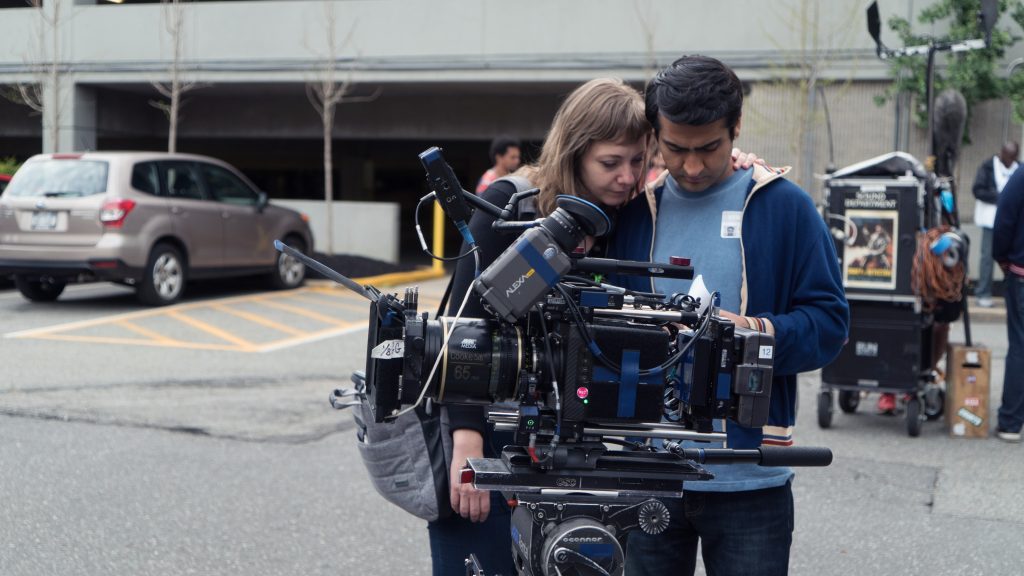
Kumail and Emily, in revisiting this part of your lives, what did you learn about yourself that surprised you?
Nanjiani: Emily was always really honest in the relationship, so there weren’t really any surprises there. What was surprising to me was talking to her friends while writing [“The Big Sick” script] and finding out what she had been saying to her friends about me. I didn’t know that she thought it took me forever to say, “I love you.” I didn’t know that was expected of me after [a certain amount of dates]. And also, she would tell her friends things about me and they would think, “This guy sounds like a nightmare.”
Gordon: On paper, you were a real mess.

To the non-South Asians in the cast, before you did this movie, how much were you aware of how much a grown man could be scared of his family if he didn’t enter into a marriage arranged by the family?
Romano: A little. I was wondering about the authenticity of that. The fact that he was actually afraid of losing his family was something I had to realize was a truth. I can see it’s a real thing.
Kazan: I had seen a tiny bit online some South Asian women saying, “Where’s our representation in this movie, just based on the trailer?” I think the movie has a better representation than the trailer. I just want to say that. Give this movie a chance.
I know Kumail and Emily talked about the casting of those parts and the embarrassment of riches of the actors that came in, and how hard it was to pick just the few that were in the movie. There aren’t enough roles for women of color in general in our industry.
And a lot of that falls on the responsibility of people like Barry and Judd—not Barry and Judd, but people like them. They make the stuff to finance films that have more rules that provide a wider representation. Sometimes those conversations can become very industry-oriented. We have to give those actors and actresses a chance. It’s really about the storytelling that is being done.
What kinds of stories can you tell if you extend past your tiny circle of comfort? I think it’s better in our humanity to have a wider representation in our culture not only because it allows those people to fell more represented on screen but also it allows people who feel very foreign to people who are Pakistani-American open then to that world.
Kher: What makes Kumail’s character endearing and more connected is because he takes care of his parents also. I think that quality makes [Kumail’s] character much more enriching and much more endearing. He listens to his parents. Also, I think arranged marriage has a lot to do with education. That’s why arranged marriages are done.
Romano: We don’t have arranged marriages in this country, but my wife’s family, if I was not Italian, they would not have welcomed me as much. I dated a Jewish girl whose family [had issues with me not being Jewish].

To the actors who played the parents, is there anything you brought to the roles that you have experienced in real life as parents?
Kher: Compassion. I think the most misunderstood relationship in the world is the father/son relationship, because both of them hold unnecessary evils. I feel a lot of compassion. The easiest thing in the world is to criticize a son … When I did all the scenes with Kumail, the only thing I felt for him was love. And if a parent conveys that love to his child, I think that makes it easier. But I think we like conflict as parents.
Romano: I think it’s easy for me to criticize my sons. I have a daughter and three boys, and they deserve criticism. They’re good, but they’re not as good as I am. I have a daughter who’s 26, who’s kind of the age of the character, so it’s kind of easy for me to tap into that fear of having her in this situation. It was pretty organic.
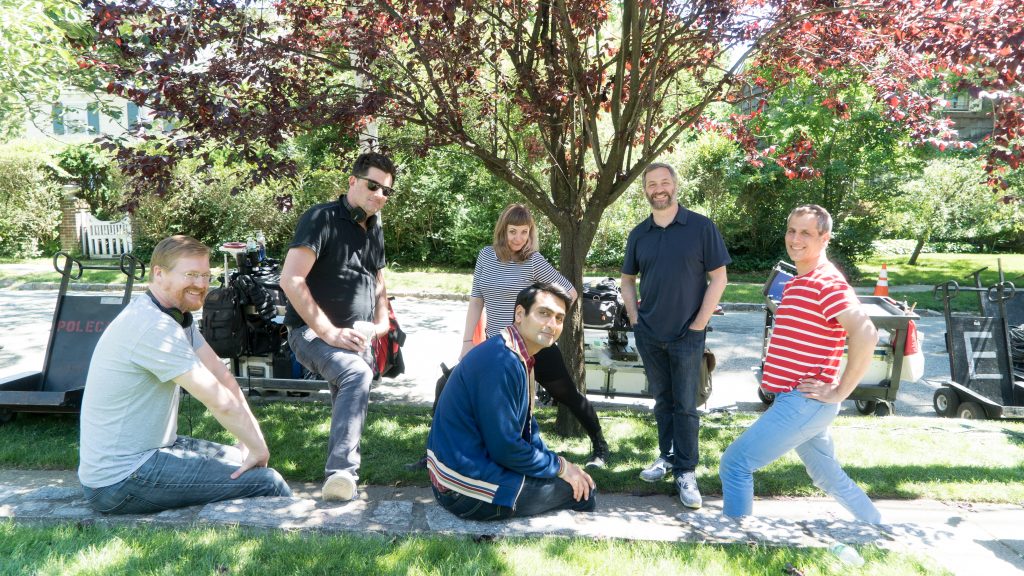
Kumail and Emily, was there anything that happened on “The Big Sick” set that exemplified keeping things honest?
Nanjiani: There were a lot of times when she would write a scene or she would write a scene, and the other person was like, “That’s not how I experienced it.” We were able to put in both of those perspectives.
Gordon: Once we were on set, we were on the same page.
Nanjiani: We had written the script about three-and-a-half years ago at that point.
Gordon: Kumail was kind of struggling with being an actor and writer and producer [for this movie], so we developed a code word that we used when we had to worry about production stuff. He just needed to be an actor. Go do what actors do. Hang out in a trailer.
Nanjiani: We didn’t have trailers. “Go hang out in your hospital room.”
Gordon: All of us wanted [Kumail] to focus on his job, which was to lead this movie. That was the biggest thing we had on set.

To the actors, did you have any question that you asked the writers that you think helped keep your characters authentic?
Hunter: I was thinking about things that attracted me to the movie. Of course, there were many unexpected things. In Act Two, the movie does veer into the revelation of characters. And it becomes this other love story between this couple [Emily’s parents] and Kumail. It becomes a love story between the three of them and how they learn to love each other.
So much of what’s funny in my life is juvenile or infantile. And the movie also skates on that level too, which makes it so much fun. But I loved the adult relationship of my and Ray’s characters’ relationship. We wanted it to stay adult. [The screenwriters] never, really truly jeopardized the relationship. I never thought, “This couple is never going to make it. This couple is going to be fine.” That’s how I felt from the beginning. I felt so grateful for that. They have an incredible bond together, and they’re going through this bond with their daughter in jeopardy with a great amount of grace and intimacy. The conflict there [between Beth and Terry] is a beautiful one that a lot of married couples relate to.


